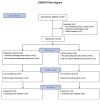The effect of maternal relaxation training on reactivity of non-stress test, Basal fetal heart rate, and number of fetal heart accelerations: a randomized controlled trial
- PMID: 25553334
- PMCID: PMC4280557
The effect of maternal relaxation training on reactivity of non-stress test, Basal fetal heart rate, and number of fetal heart accelerations: a randomized controlled trial
Abstract
Background: Relaxation-training, as an anxiety-reducer intervention, plays an important role in fetal health. The present study aimed to analyze the effect of maternal relaxation on stress test (NST), basal fetal heart rate, and number of fetal heart accelerations.
Methods: In this randomized controlled trial, 84 pregnant women were randomly divided into two groups of teaching relaxation and control groups in 2012. In the intervention group, 60-90 minute classes were held every week lasting for 4 weeks. Besides, home practice charts were given to the mothers and researchers controlled the home practices by phone calls every week. The control group received routine prenatal care. In the 4(th) week, NST was performed in the intervention group 30 minutes before and after the 4(th) session. In the control group, NST was done in the 4(th) week. The quantitative variables in the two groups were compared through ANOVA and Chi-square test.
Results: The results of paired t-test showed that relaxation could improve the NST results (P=0.01). Mean and standard deviation of basal fetal heart rate was 138.95±8.18 before the intervention and 133.07±6.9 after the intervention. Paired t-test also showed that relaxation reduced the basal fetal heart rate (P=0.001). Mean and standard deviation of the number of fetal heart accelerations was 1.5±0.8 before the intervention and 2.2±0.9 after it. The results of paired t-test also showed that relaxation increased the number of fetal heart accelerations (P=0.001).
Conclusions: Relaxation could improve the NST results, reduce the basal fetal heart rate, and increase the number of fetal heart accelerations. Therefore, relaxation is recommended during pregnancy.
Trial registration number: IRCT2012072810418N1.
Keywords: Accelerations; Fetal Heart; Heart Function Test; Relaxation.
Figures
References
-
- Fink NS, Urech C, Cavelti M, Alder J. Relaxation during pregnancy: what are the benefits for mother, fetus, and the newborn? A systematic review of the literature. J Perinat Neonatal Nurs. 2012;26:296–306. - PubMed
-
- Armstrong DS. Emotional distress and prenatal attachment in pregnancy after perinatal loss. Journal of Nursing Scholarship. 2002;34:339–45. - PubMed
-
- Pruessner JC, Dedovic K, Khalili-Mahani N. Deactivation of the limbic system during acute psychosocial stress: evidence from positron emission tomography and functional magnetic resonance imaging studies. Biol Psychiatry. 2008;63:234–40. - PubMed
-
- Niederhofer H, Reiter A. Prenatal maternal stress, prenatal fetal movements and perinatal temperament factors influence behavior and school marks at the age of 6 years. Fetal Diagn Ther. 2004;19:160–62. - PubMed
-
- Laplante DP, Brunet A, Schmitz N. Project ice storm: prenatal maternal stress affects cognitive and linguistic functioning in 5 (1/2)-year-old children. J Am Acad Child Adolesc Psychiatry. 2008;2:1063–72. - PubMed
LinkOut - more resources
Full Text Sources

